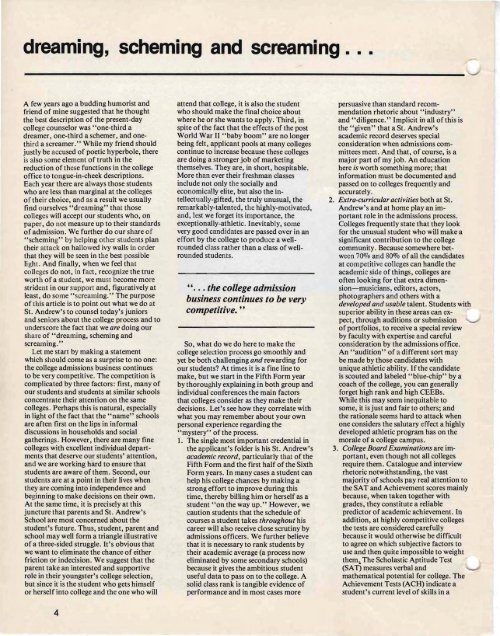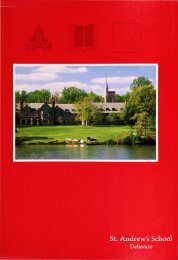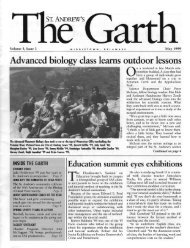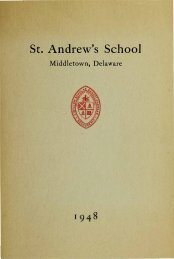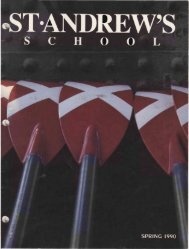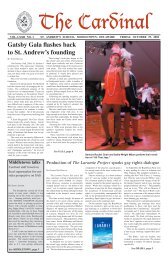Sl:ANDREWS - Saint Andrew's School Archive - St. Andrew's School
Sl:ANDREWS - Saint Andrew's School Archive - St. Andrew's School
Sl:ANDREWS - Saint Andrew's School Archive - St. Andrew's School
Create successful ePaper yourself
Turn your PDF publications into a flip-book with our unique Google optimized e-Paper software.
dreaming, scheming and screaming . • •<br />
A few years ago a budding humorist and<br />
friend of mine suggested that he thought<br />
the best description of the present-day<br />
college counselor was "one-third a<br />
dreamer, one-third a schemer, and onethird<br />
a screamer." While my friend should<br />
justly be accused of poetic hyperbole, there<br />
is also some element of truth in the<br />
reduction of these functions in the college<br />
office to tongue-in-cheek descriptions.<br />
Each year there are always those students<br />
who are less than marginal at the colleges<br />
of their choice, and as a result we usually<br />
find ourselves "dreaming" that those<br />
colleges will accept our students who, on<br />
paper, do not measure up to their standards<br />
of admission. We further do our share of<br />
"scheming" by helping other students plan<br />
their attack on hallowed ivy walls in order<br />
that they will be seen in the best possible<br />
light. And finally, when we feel that<br />
colleges do not, in fact, recognize the true<br />
worth of a student, we must become more<br />
strident in our support and, figuratively at<br />
least, do some "screaming." The purpose<br />
of this article is to point out what we do at<br />
<strong>St</strong>. <strong>Andrew's</strong> to counsel today's juniors<br />
and seniors about the college process and to<br />
underscore the fact that we are doing our<br />
share of "dreaming, scheming and<br />
screaming."<br />
Let me start by making a statement<br />
which should come as a surprise to no one:<br />
the college admissions business continues<br />
to be very competitive. The competition is<br />
complicated by three factors: first, many of<br />
our students and students at similar schools<br />
concentrate their attention on the same<br />
colleges. Perhaps this is natural, especially<br />
in light of the fact that the "name" schools<br />
are aften first on the lips in informal<br />
discussions in households and social<br />
gatherings. However, there are many fine<br />
colleges with excellent individual departments<br />
that deserve our students' attention,<br />
and we are working hard to ensure that<br />
students are aware of them. Second, our<br />
students are at a point in their lives when<br />
they are coming into independence and<br />
beginning to make decisions on their own.<br />
At the same time, it is precisely at this<br />
juncture that parents and <strong>St</strong>. <strong>Andrew's</strong><br />
<strong>School</strong> are most concerned about the<br />
student's future. Thus, student, parent and<br />
school may well form a triangle illustrative<br />
of a three-sided struggle. It's obvious that<br />
we want to eliminate the chance of either<br />
friction or indecision. We suggest that the<br />
parent take an interested and supportive<br />
role in their youngster's college selection,<br />
but since it is the student who gets himself<br />
or herself into college and the one who will<br />
attend that college, it is also the student<br />
who should make the final choice about<br />
where he or she wants to apply. Third, in<br />
spite of the fact that the effects of the post<br />
World War II "baby boom" are no longer<br />
being felt, applicant pools at many colleges<br />
continue to increase because these colleges<br />
are doing a stronger job of marketing<br />
themselves. They are, in short, hospitable.<br />
More than ever their freshman classes<br />
include not only the socially and<br />
economically elite, but also the intellectually-gifted,<br />
the truly unusual, the<br />
remarkably-talented, the highly-motivated,<br />
and, lest we forget its importance, the<br />
exceptionally-athletic. Inevitably, some<br />
very good candidates are passed over in an<br />
effort by the college to produce a wellrounded<br />
class rather than a class of wellrounded<br />
students.<br />
" ... the college admission<br />
business continues to be very<br />
competitive. "<br />
So, what do we do here to make the<br />
college selection process go smoothly and<br />
yet be both challenging and rewarding for<br />
our students? At times it is a fine line to<br />
make, but we start in the Fifth Form year<br />
by thoroughly explaining in both group and<br />
individual conferences the main factors<br />
that colleges consider as they make their<br />
decisions. Let's see how they correlate with<br />
what you may remember about your own<br />
personal experience regarding the<br />
"mystery" of the process.<br />
1. The single most important credential in<br />
the applicant's folder is his <strong>St</strong>. <strong>Andrew's</strong><br />
academic record, particularly that of the<br />
Fifth Form and the first half of the Sixth<br />
Form years. In many cases a student can<br />
help his college chances by making a<br />
strong effort to improve during this<br />
time, thereby billing him or herself as a<br />
student "on the way up." However, we<br />
caution students that the schedule of<br />
courses a student takes throughout his<br />
career will also receive close scrutiny by<br />
admissions officers. We further believe<br />
that it is necessary to rank students by<br />
their academic average (a process now<br />
eliminated by some secondary schools)<br />
because it gives the ambitious student<br />
useful data to pass on to the college. A<br />
solid class rank is tangible evidence of<br />
performance and in most cases more<br />
persuasive than standard recommendation<br />
rhetoric about "industry"<br />
and "diligence." Implicit in all of this is<br />
the "given" that a <strong>St</strong>. <strong>Andrew's</strong><br />
academic record deserves special<br />
consideration when admissions committees<br />
meet. And that, of course, is a<br />
major part of my job. An education<br />
here is worth something more; that<br />
information must be documented and<br />
passed on to colleges frequently and<br />
accurately.<br />
2. Extra-curricular activities both at <strong>St</strong>.<br />
<strong>Andrew's</strong> and at home play an important<br />
role in the admissions process.<br />
Colleges frequently state that they look<br />
for the unusual student who will make a<br />
significant contribution to the college<br />
community. Because somewhere between<br />
700/0 and 80% of all the candidates<br />
at competitive colleges can handle the<br />
academic side of things, colleges are<br />
often looking for that extra dimension-musicians,<br />
editors, actors,<br />
photographers and others with a<br />
developed and usable talent. <strong>St</strong>udents with<br />
superior ability in these areas can expect,<br />
through auditions or submission<br />
of portfolios, to receive a special review<br />
by faculty with expertise and careful<br />
consideration by the admissions office.<br />
An "audition" of a different sort may<br />
be made by those candidates with<br />
unique athletic ability. If the candidate<br />
is scouted and labeled "blue-chip" by a<br />
coach of the college, you can generally<br />
forget high rank and high CEEBs.<br />
While this may seem inequitable to<br />
some, it is just and fair to others; and<br />
the rationale seems hard to attack when<br />
one considers the salutary effect a highly<br />
developed athletic program has on the<br />
morale ofa college campus.<br />
3. College Board Examinations are important,<br />
even though not all colleges<br />
require them. Catalogue and interview<br />
rhetoric notwithstanding, the vast<br />
majority of schools pay real attention to<br />
the SAT and Achievement scores mainly<br />
because, when taken together with<br />
grades, they constitute a reliable<br />
predictor of academic achievement. In<br />
addition, at highly competitive colleges<br />
the tests are considered carefully<br />
because it would otherwise be difficult<br />
to agree on which subjective factors to<br />
use and then quite impossible to weight<br />
them. The Scholastic Aptitude Test<br />
(SAT) f11easures verbal and<br />
mathematical potential for college. The<br />
Achievement Tests (ACH) indicate a<br />
student's current level of skills in a<br />
4


